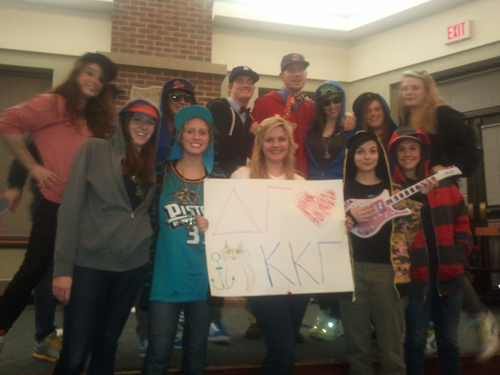Sorority girls walk arm in arm. They saunter around in clumps and clusters. They giggle, examine their hair and complain loudly about school work.
They also smile and greet each other enthusiastically. Names are screeched from across hallways as girls sprint into each other’s arms.
“You look so cute” and “I miss you in my life” and hugs and kisses are regularly expressed and administered.
This affection is not exchanged merely between members of the same sorority. It’s a Panhellenic affair. Kappa Kappa Gamma, Delta Delta Delta, Delta Gamma, Delta Zeta and Kappa Alpha Theta comprise Ohio Wesleyan University’s sorority community. The hundreds of women who make up this community find themselves able and willing to make meaningful connections with members of sororities outside of their own.
Thursday, Feb. 23, is a busy day in the Hamilton Williams Campus Center atrium. Sorority and fraternity members have made their way upstairs to the Benes Rooms. These “Greek” students have gathered to sing, dance and put on a somewhat cheesy smile for a good cause. Kappa Kappa Gamma is holding their annual Kappa Karaoke event to raise funds for the Reading is Fundamental Foundation, which works to amend illiteracy issues among young children in urban areas.
According to freshman, Tucker Fontanella, a Sigma Phi Epsilon fraternity member, Kappas are the smart girls.
The Tri-Deltas use gimmicks in their Kappa Karaoke act. Umbrellas add color to their performance of “It’s Raining Men” and sophomore, Timothy O’Keefe, a member of Sigma Chi, suggestively removes his jacket and throws confetti in the air during the performance. Theta also enlists the use of a Sig Chi Senior Phillip Forsgren, who is dressed in all black and a pair of sunglasses, stands back and observes the sequin-dressed Thetas shake it onstage.
According to junior and Theta president Amy Siemon, Thetas know how to “play hard.”
33 percent of the OWU campus is Greek, according to Dana Behum, assistant director of sorority and fraternity life at OWU. Behum says that the stereotypes of the different sororities at OWU ebb and flow as new members are initiated while the make-up of the sorority changes. These stereotypes, while a reality nationally, could vary by college. A sorority at one college may be perceived and stereotyped in a totally different light than the same sorority would be at another, according to Behum.
GIRLS SAY
“We hang out with the people we’re most comfortable with, but we do that in real life too. There’s a tendency to gravitate toward people who are like you,” said junior Megan Cook, a member of Delta Zeta.
Cook said DZs are stereotyped as “the nerds who spend their weekends playing monopoly in Welch (Hall).”
“We’re still considered the fat nerds who don’t go out,” said Cook.
Cook is well under 140 lbs.
When Cook went through formal recruitment in the spring of 2010, she had a strong inclination to be a DZ because she had always admired DZ girls. While standing in line to enter the DZ house on the first day of recruitment, Cook heard a girl mutter behind her.
“Isn’t this the weird house?”
Cook said she believes these stereotypes have been breaking down in the two years since she went through formal recruitment due to a progression of new women who have been initiated into the Delta Zeta sorority. She is now the proud president of DZ. She smiles as she discusses her devotion to the sorority that has shaped her life and made her a more confident member of the OWU community.
Siemon, the recently elected president of Kappa Alpha Theta, said she thinks stereotypes are unavoidable and are often true.
“We are all over-involved and control freaks and we all wear scarves,” said Siemon. “But people tend to focus on the negatives.”
Siemon said she thinks stereotypes are far from an all-encompassing reality.
“I’ve heard a lot of stereotypes and I would lie if I said I’ve never repeated them, but I don’t think it encompasses everyone in (every) house. I think … people want to mentally categorize groups on campus.”
Siemon said she believes stereotypes could be removed if the campus community were to look not at groups of sorority members, but at individuals in the groups.
Siemon is friends with girls in many of the sororities on campus and lives with two women who are Tri-Delta members.
Junior and Kappa member Kelsey Brown agrees with Siemon’s sentiments and said she thinks women commonly tend to socialize with those women in their major, regardless of affiliation. Brown cites common personality characteristics and values as reasons for building friendships. Brown is friends with many women in Delta Gamma who share her major of early childhood education.
Brown knew she would be a Kappa but was not convinced the sorority was her top pick. After receiving her bid, however, she was pleased with how the recruitment process turned out. She believes she shares many of the same values as her sisters, but also some of the stereotypes.
“I’ve heard that (Kappas) are kind of awkward and we can’t really carry a conversation,” Brown said. “I’d say these stereotypes are kind of hurtful, but I really am … awkward.”
Brown echoes Siemon’s sentiments that students focus upon the negatives in stereotyping their peers.
“But people are negative today in everything,” said Brown.
Junior Gabriella Melgar, an unaffiliated woman, said she thinks these stereotypes could be broken down if students were to look at the diversity within each sorority. She says there is a conscious decision made by women who choose to affiliate themselves with those they are similar to.
“I think it’s just an issue of ‘do you want to hang out with people that are just like you, or branch out,’” said Melgar.
BOYS SAY
Male students on campus see stereotypes of the different sororities as an obvious reality. They often see these stereotypes as a large problem.
Junior Samuel Irvine, an unaffiliated man, said he believes sorority stereotypes to be a negative issue on the OWU campus and offers solutions to rectify this issue.
“When I hear unaffiliated girls discuss their bids it is disheartening to hear, ‘Delta Zeta is equivalent to a lesbian clan’, or ‘if you don’t have pastel colored attire in your wardrobe forget Tri-Delta,’” said Irvine. “What happened to the sense of community that binds sororities together, not as individual organizations, but as a Greek community as a whole?”
Irvine said he believes that through events planned for the entire Panhellenic community, Greek women can be brought together to realize they share a multitude of similarities, even merely because they are all campus women.
“When women can gather themselves around common issues such as self-defense workshops and workshops that teach women about their bodies they can help eliminate those stereotypes,” said Irvine.
Senior Tyler Hall, an unaffiliated man, said he thinks stereotypes of the Panhellenic community as a whole can be disheartening.
“Most people see pictures on Facebook … and associate it with sororities. For most people, the only time they have visited a sorority house or been around sorority women is at a party,” said Hall. “Most people do not recognize the philanthropic efforts made by women in all of the sororities.”
Hall said this is a shame.
Fontanella, as a member of a fraternity, has heard specific stereotypes of each sorority throughout his freshman year so far. He said he believes some of these stereotypes to be offensive and untrue.
“When I came on my recruiting visit I was told Tri-Deltas are slutty, but this isn’t true of the few friends I have in Tri-Delta,” he said.
Fontanella said he, as a Sig Ep, does not spend time equally with women in all sororities.
“I don’t know much about the Delta Zetas,” he said.
The Sig Eps have only had mixers with Theta and DG.
Sorority members tend to socialize with those fraternity men they are most comfortable around.
Brown enjoys spending time at the Delta Tau Delta fraternity, but believes this preference to be part of a personal connection she has developed with the men there. Cook enjoys spending time with the men of Alpha Sigma Phi and Chi Phi. She would classify these men as “less creepy.”
Junior Corey Castelli, a member of Alpha Sig, said he does not agree stereotypes of sorority-fraternity relations are all negative. He prefers Kappas. He thinks his brothers do as well.
“Kappas are more open and other sorority members are more exclusive,” he said.
Castelli said he does not see an issue in a lack of socialization with members of different sororities.
“We tend to hang out with people who are more similar to us. Some groups may just be incompatible,” he said.
Castelli said believes there is a history of friendships between certain sororities and fraternities.
“We hang out with mutual friends and to make a bridge between a new sorority and fraternity is more difficult and is therefore not usually done.”
CAN’T BE DENIED
Cook said she sees the stereotypes of her sorority to be a part of the community she connects with. She sees the stereotype that many DZs are members of the LGBT community on campus as a positive aspect of her sorority. Approximately 25 percent of the Delta Zeta sorority identifies as LGBT.
“We’re proud to collect such a diverse crowd,” said Cook. “LGBT women gravitate towards (our sorority) because we create a supportive environment.”
Cook herself finds support in this community as well. She refers to one of the couches DZ sit at during the lunch hour as “DZ land.” She said she feels most comfortable there.
She wants to make some changes in the way her sisters view themselves and their sorority.
“I want us to stop worrying (about stereotypes). I think its way more important to build sisterhood from within and the rest will follow.”
Behum is not especially concerned with the current sorority stereotypes either. She says students will move on.
“Any given sorority changes with each new pledge class, and the cycle of stereotyping continues,” she said.
Behum said professors have even been known to see girls differently based upon which sorority they belong to.
“These impressions are not always true, though,” said Behum.
She cites this as a problem, a problem related to the fact that there lies great diversity between the members of any given sorority from those of another sorority. One member should not be judged based upon the stereotypes put upon the sorority she belongs to as a whole.
Craig Ramsay, professor of politics and government at OWU, has never personally encountered this problem.
“I have been a college professor for over thirty years and I have never perceived sorority women as having any particular pattern of characteristics,” said Ramsay. “Of course, I only on a rare occasion even know which women students belong to a sorority.”
Jeffrey Nunemacher, chairperson and Parrott professor of mathematics and computer science, does not even have an opinion on the issue.
Overall, Behum thinks sorority life is largely beneficial for any woman. Behum herself was a sorority member at Bowling Green State University.
Behum believes, as Brown does, that values and strong friendships bind members of one sorority together, not stereotypes. OWU sorority women should be proud of their ability to associate well with girls in any sorority.
The euphoric, friendly and positive environment at Kappa Karaoke is a testament to this. Girls should focus upon building Panhellenic spirit and disregard any stereotypes. But Behum, as well as Brown, Siemon, Cook, Hall, Irvine, Fontanella, Melgar and Castelli cannot deny their existence.






I don’t appreciate how my sorority is portrayed on here, Kathleen Dalton. Based on how quickly source memory fades and how long familiarity remains – even just mentioning the stereotypes creates a lasting impact that many won’t soon forget, but they will forget that they read it in an article that is trying to break down the stereotypes. It was poor planning on your part.
Why did a Delta Gamma write this?
I think that it is a pretty fair statement. Greek life is meant to foster a community and with communities, there are stereotypes.
You can make stereotypes about Greek life as you can about any other group on campus. It will affect how people look at you, but you can choose to accept or not. If you don’t like it, fight back. Groups are built on people with similar interests, Greek or otherwise. It’s what makes them cohesive and lasting. It’s up to you as an organization to allow people to look past your stereotype and not just get offended by it.
Stereotypes are exaggerations based on loose facts.
Why is this a lead story on the sidebar? It’s from 2012.